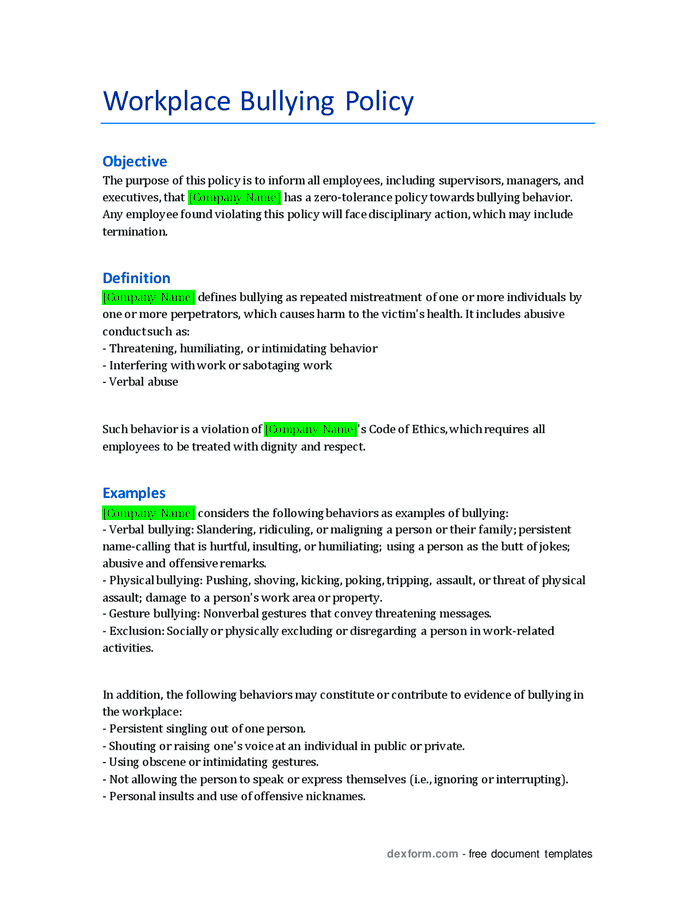Addressing Workplace Bullying Laws in New Jersey
Numerous workers face severe problems like workplace bullying on their job places. It means deliberately mistreating someone at work over a long period of time. Some examples include verbally abusing them, making threats against them or hindering their ability to perform well in a specific line of duty. Such actions make workplaces hostile for employees and this can really have adverse effects on the health of these employees both physically and mentally.In New Jersey, there is no clear law that specifically addresses workplace bullying. However, there are a few statutes that can alleviate related concerns:There are many manifestations of workplace harassment. A few examples include:
New Jersey Laws on Workplace Bullying

- New Jersey Law Against Discrimination (NJLAD): Prohibits discrimination based on race, color, national origin, sex, and other protected characteristics. Bullying that targets these attributes can be addressed under NJLAD.
- Occupational Safety and Health Administration (OSHA): While not specific to bullying, OSHA’s general duty clause requires employers to provide a safe working environment. Severe cases of bullying that impact safety can fall under OSHA regulations.
- Worker’s Compensation Laws: Employees who suffer from psychological harm due to workplace bullying may be eligible for worker’s compensation benefits.
Types of Workplace Bullying
- Verbal Abuse: Includes insults, threats, and constant criticism. Examples are shouting at employees or making derogatory comments.
- Social Exclusion: Involves isolating an employee from team activities or ignoring their contributions. This can damage an employee’s reputation and morale.
- Work Sabotage: Intentional interference with an employee’s work performance, such as withholding necessary information or giving unreasonable deadlines.
- Physical Intimidation: Includes actions like blocking someone’s path, invading personal space, or making threatening gestures.
- Cyberbullying: Using electronic communications to harass or intimidate, such as sending threatening emails or posting harmful comments online.
Even though there isn’t a certain legislation whose main aim is to fight bullying, workers in New Jersey are accorded different legal forms of protection against it. There are many sources of these safeguards:Should you be facing workplace harassment, following the appropriate procedure may assist in tackling the problem and safeguarding one’s entitlements:Bullying in the workplace is a problem that employers in New Jersey must deal with and prevent by taking different measures:
Legal Protections for Employees
- Anti-Discrimination Laws: Under the New Jersey Law Against Discrimination (NJLAD), employees are protected from discrimination and harassment based on race, gender, sexual orientation, disability, and other protected characteristics. If bullying is related to these protected categories, it may be considered a form of discrimination.
- Harassment Claims: If bullying includes sexual harassment or creates a hostile work environment, it can be addressed under federal and state harassment laws. Employees can file complaints with the Equal Employment Opportunity Commission (EEOC) or the New Jersey Division on Civil Rights.
- Worker’s Compensation: Employees who suffer psychological or physical harm due to bullying may be eligible for workers’ compensation benefits. This includes coverage for medical expenses and lost wages resulting from the bullying.
- Occupational Safety and Health Standards: Although not specific to bullying, OSHA’s general duty clause requires employers to maintain a safe work environment. Severe bullying that affects workplace safety can fall under these regulations.
Steps to Take if You Experience Bullying
- Document Everything: Keep a detailed record of incidents, including dates, times, and descriptions of the bullying behavior. Collect any relevant emails, messages, or other evidence.
- Report the Bullying: Notify your supervisor or human resources department about the bullying. Provide them with your documentation and a clear account of what is happening.
- Seek Support: Consider speaking with a trusted colleague or counselor for emotional support. They can provide advice and help you cope with the situation.
- File a Formal Complaint: If internal reporting does not resolve the issue, you may need to file a formal complaint with state or federal agencies, such as the EEOC or New Jersey Division on Civil Rights.
- Consult an Attorney: If you believe your legal rights are being violated, seek advice from an attorney specializing in employment law. They can help you understand your options and potential remedies.
Employer Responsibilities
- Creating a Safe Work Environment: Employers must ensure a safe and respectful workplace. This includes implementing policies that address bullying and harassment.
- Providing Training: Employers should provide training for employees and management on recognizing and preventing bullying. This helps create awareness and a supportive work culture.
- Establishing Reporting Procedures: Employers need to have clear procedures for reporting bullying. These procedures should be easily accessible and include steps for investigating complaints.
- Investigating Complaints: When a complaint is made, employers must conduct a thorough investigation. This includes interviewing witnesses, reviewing evidence, and taking appropriate action to address the issue.
- Taking Corrective Action: If bullying is confirmed, employers must take corrective action to stop the behavior and prevent it from recurring. This may involve disciplinary measures or changes in work assignments.
- Protecting Employees: Employers must protect employees from retaliation for reporting bullying or participating in investigations. Retaliation is illegal and can result in additional legal consequences.
In case you encounter workplace harassment, lodging a grievance is an important aspect of resolving the problem. Here’s what you can do:There are several reference materials at hand to assist any persona who may be undergoing workplace harassment.Repeated and intentional mistreatment of a worker is what characterizes workplace harassment. It can be verbal abuse, social exclusion, work disrupting or physical intimidation or cyber bulling.New Jersey does not have specific laws that are aimed at workplace bullying. Nevertheless, related matters can be addressed through anti-discrimination laws, harassment claims and workplace safety regulations.In case internal complaints are not sorted out, you may approach state organizations for example, the New Jersey Division on Civil Rights or raise a concern with the EEOC. It might also be essential to get legal counsel.True, if any harassment or discrimination is committed involving bullying then one can move to court. A specialized lawyer who deals with labor issues will help you comprehend what legal means are available for you in this case.The support resources available for those affected include programs that assist employees, legal aid organizations, and support groups to mention but a few among others; additionally professionals who provide counseling services also exist while there are several other online platforms such as the Workplace Bullying Institute (WBI).
How to File a Complaint
- Internal Complaint: Start by reporting the bullying to your employer. Follow the company’s established procedures for submitting a complaint, which often involves filling out a formal grievance form or contacting human resources. Provide detailed documentation of the incidents.
- Contact State Agencies: If internal channels do not resolve the issue, you may contact the New Jersey Division on Civil Rights. This agency investigates complaints of discrimination and harassment. You can file a complaint online or by mail.
- File with Federal Agencies: For bullying that involves discrimination based on race, gender, or other protected characteristics, you can file a complaint with the Equal Employment Opportunity Commission (EEOC). The EEOC handles federal workplace discrimination claims.
- Legal Action: If your issue remains unresolved, consulting an attorney specializing in employment law may be necessary. They can guide you through the process of filing a lawsuit if needed and represent your interests in legal proceedings.
Resources and Support
- Employee Assistance Programs (EAPs): Many companies offer EAPs that provide confidential counseling and support services for employees dealing with workplace issues, including bullying.
- Legal Aid Organizations: Various organizations offer free or low-cost legal assistance for employees facing discrimination and harassment. Examples include Legal Services of New Jersey and local bar associations.
- Support Groups: Joining support groups for bullying victims can provide emotional support and practical advice. These groups can be found online or through local community organizations.
- Professional Counselors: Seeking help from a licensed therapist or counselor can be beneficial for coping with the emotional effects of bullying. They can offer strategies for managing stress and building resilience.
- Online Resources: Websites like the Workplace Bullying Institute provide information, tools, and resources for understanding and dealing with workplace bullying.
Frequently Asked Questions on Workplace Bullying in New Jersey
- What is workplace bullying?
Workplace bullying refers to repeated, unreasonable actions directed at an employee that are intended to intimidate, degrade, or undermine their work performance. It can include verbal abuse, threats, sabotage, or inappropriate behavior that creates a hostile work environment. - Are there specific laws for workplace bullying in New Jersey?
New Jersey does not have specific laws that address workplace bullying directly. However, many forms of bullying can fall under existing anti-discrimination, harassment, and retaliation laws, especially if the behavior is based on race, gender, age, or other protected characteristics. - What should I do if my employer does not address my bullying complaint?
If your employer fails to address your bullying complaint, you should document all incidents of bullying, follow your company’s formal complaint procedures, and consider filing a complaint with the Equal Employment Opportunity Commission (EEOC) or New Jersey Division on Civil Rights. Seeking legal advice can also be beneficial. - Can I take legal action for workplace bullying?
While there are no specific workplace bullying laws in New Jersey, if the bullying involves discrimination or harassment based on a protected category, you may be able to take legal action under state or federal employment laws. Consult an employment attorney to explore your options. - What resources are available for support?
Support for workplace bullying includes internal human resources channels, employee assistance programs (EAPs), legal support from employment lawyers, and external agencies such as the EEOC and New Jersey Division on Civil Rights. You can also find support through local anti-bullying organizations and mental health professionals.
Conclusion:
Addressing workplace bullying is crucial to maintaining a healthy and productive work environment. While New Jersey may lack specific workplace bullying laws, there are legal protections through anti-discrimination and harassment statutes. Employees should document incidents, report them through proper channels, and seek legal or professional support when necessary. Employers must create safe environments, provide training, and handle complaints effectively to prevent and address bullying. By understanding your rights and accessing available resources, you can take proactive steps to effectively tackle workplace bullying.


